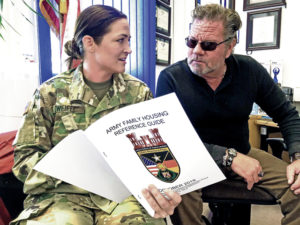Most Soldiers put the worries of work out of their mind when they arrive home. However, for a select few Soldiers and noncommissioned officers, coming home means more work.
They are the stairwell and building coordinators of Baumholder Army Family Housing. There are 80 building coordinator slots in the Baumholder Military Community.
“Ask any building coordinator, past or present, and I bet they will tell you it’s one of the most challenging and rewarding experiences they’ve had in their military career,” said Jim Gillis, Baumholder Army Housing deputy director.
Gillis assigns the coordinators after consultation with the outgoing building coordinator and by surveying the residents of the building. A building coordinator usually serves in that position until he or she has a permanent change of station.
“Their authority comes from the garrison commander,” Gillis said.

But, that doesn’t make a building coordinator’s job easy. Much of the coordinator’s job is done after their normal military work hours and on weekends. And, the building coordinators may not be the most senior military member in their stairwell, much less in the whole building made up of 16 apartments.
Staff Sgt. Kylie Zweifel, 8th Medical Logistics Company, has been the coordinator in her building since February. She said, sometimes, residents need a gentle reminder about their building duties and sometimes, they need something less gentle.
“I’ve done the door-to-door knocking and I’ve done the Post-it reminders. I’ve done all that,” Zweifel said. “People will stop answering their door because they know I’m there to remind them it’s their turn to clean or mow the lawn.”
Gillis said building coordinators can use him to make sure the housing chores get done, but most coordinators use each other.
“The all have the same list, so they look for another coordinator who is in the same unit as their resident and asks that other coordinator to have a talk with that person,” Gillis said.
Each housing resident is given a copy of the Army Family Housing Reference Guide when they sign for a home.
Sgt. Marion Kirkland, Human Resources Operations Branch, 16th Sustainment Brigade, sees his duty as building coordinator as just another task given to a Soldier. He said he tries to act as a messenger rather than an enforcer.
“I always show them in the reference guide where it says housing residents must do such-and-such,” Kirkland said. “That way, it’s not Sgt. Kirkland saying they have to do it, it’s the garrison commander and housing saying it and I’m just their voice for this building.”
Building coordinators set schedules for residents to follow; yardwork, sweeping the stairwell, etc. Zweifel said it sometimes comes as a shock when families learn the schedules are not just for the military member.
“A common misconception is the residents think it’s just the Soldier’s responsibility to take care of the cleaning,” she said. “It’s the entire residence. If the military member is away on a mission, that residence is still responsible for adhering to the schedule.”
However, some situations can’t be planned for.
“The housing manual is not built for every situation, even though that’s the intent,” said former building coordinator Sgt. Stepheon Coles, 10th Army Air and Missile Defense Command. “I have had doors slammed in my face by spouses who think it’s OK to use their children as an excuse not to clean up. When you ask for participation, everyone gets personal real fast.”
Kirkland said unofficial housing and resident social media pages might also get out of hand from time to time.
“I had a resident who was having a serious argument with a resident in another building on Facebook for everyone to see,” Kirkland said. “Finally, the other building coordinator and I brought the two women together, face-to-face, and they were able to work it out.”
Gillis said that example is exactly why building and stairwell coordinators are needed. He said it’s not always about being an enforcer: many times it’s about one resident helping a neighbor.
“Any installation that is having upkeep issues and problems with good order in their Army Family Housing will have a non-existent or non-engaged building coordinator program in my opinion,” Gillis said.


